If you love almond paste desserts, the classic Italian pignoli cookie is a must make. This vegan version replaces the egg whites in the original recipe while still delivering a deliciously chewy, almond flavored cookie with a crunchy toasted pine nut top!
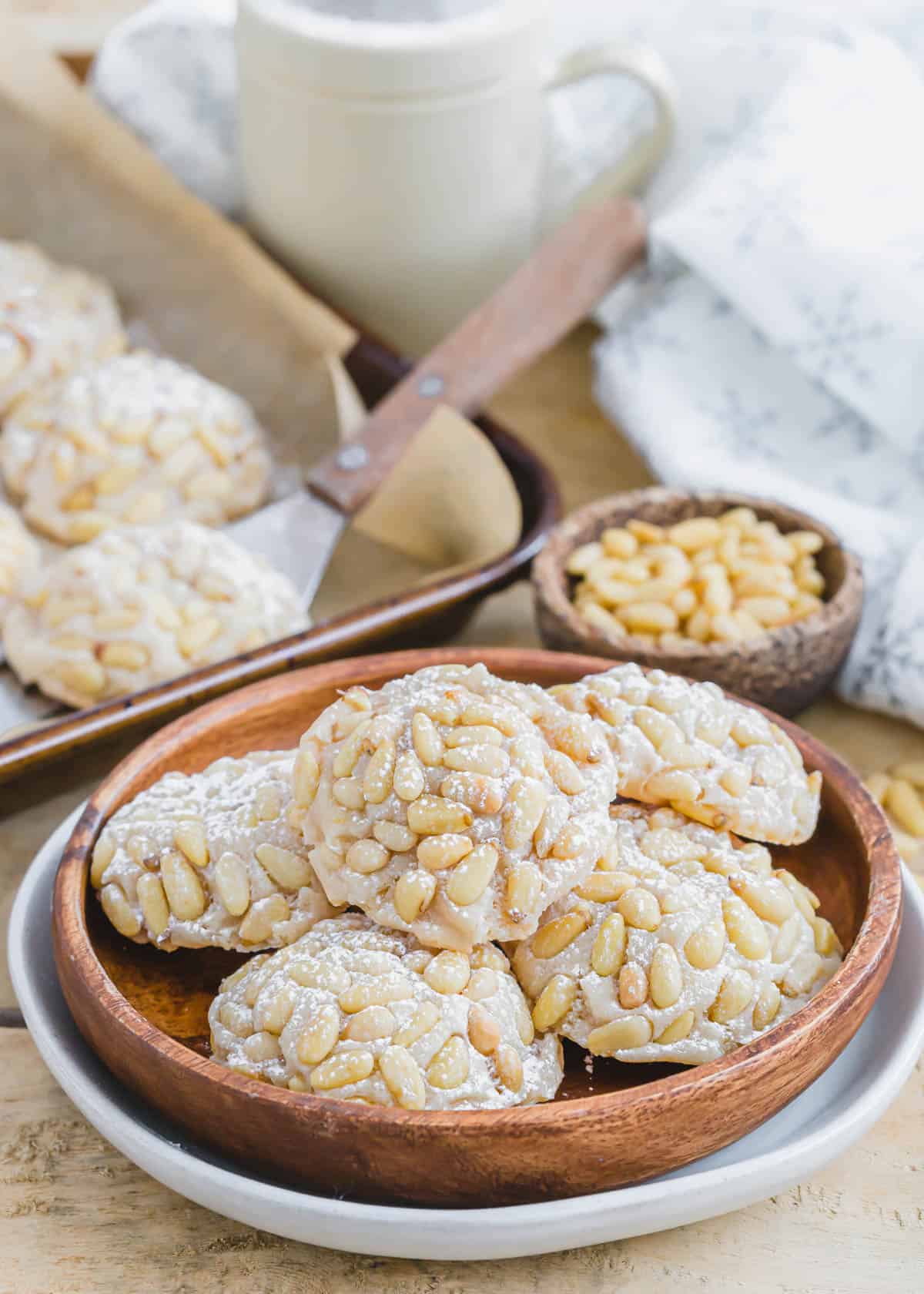
Pignoli cookies evoke a type of nostalgia for me that’s almost palpable.
Every single holiday gathering of my childhood involved a big white pastry box from a local Italian bakery filled with all the best cookies.
From rainbow cookies to cannolis, sfogliatelle, biscotti and of course, pignoli cookies, there was always a huge box accompanying every dessert spread no matter the occasion.
While my palate as a kid would pick out a rainbow cookie over everything else, my adult palate is here for the pignoli cookies all day long.
The secret is in the almond paste.
After chocolate, give me an almond dessert (like this ricotta almond fig cake or an almond croissant) any day.
And that’s exactly what pignoli cookies are – a decadently sweet and chewy almond paste filled cookie topped with toasted pine nuts.
Their delicious taste far surpasses their effort and with just a simple tweak, they can easily be made vegan.
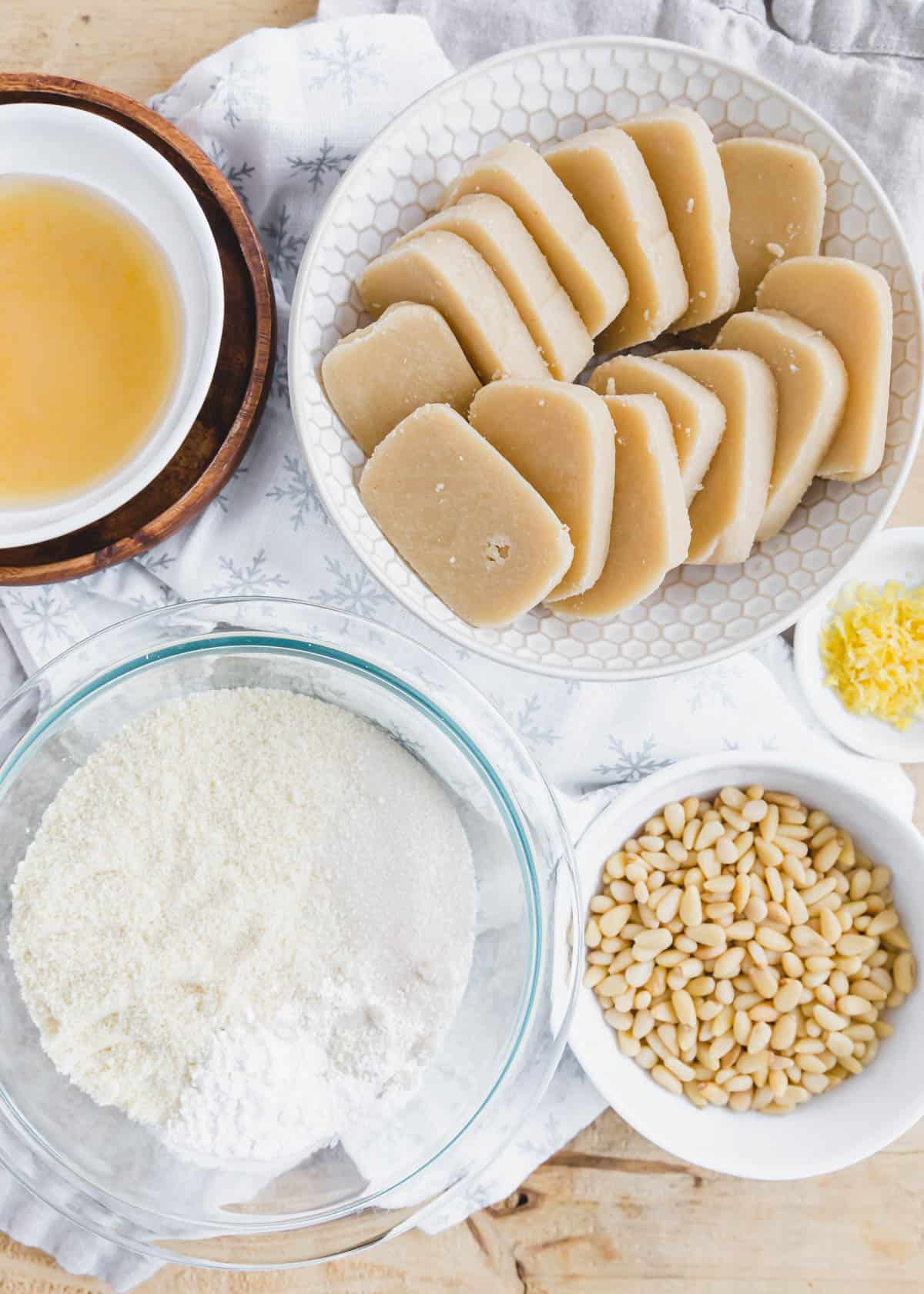
INGREDIENTS TO MAKE VEGAN PIGNOLI COOKIES
- almond paste (not marzipan)
- sugar
- almond flour
- tapioca starch (or cornstarch/arrowroot powder)
- baking powder
- salt
- lemon zest (optional)
- aquafaba
- pignoli nuts (pine nuts)
- powdered sugar for dusting
USING AQUAFABA IN PIGNOLI COOKIES
If you’re new to the idea of aquafaba, it’s the brine from a can of chickpeas and a common vegan substitution for egg whites.
I’ve used it before in savory recipes like these baked asparagus fries but this was my first time using it in a baked good.
Usually, I default to a flax or chia egg for my vegan and dairy-free baking. Flax eggs work great in things like gingerbread banana bread and chia eggs in recipes like these sweet potato cookies.
But both of those “normal” substitutes seemed too far a stretch for a delicate recipe like pignoli cookies. They both add fiber and fat that could easily disrupt the coveted texture of the chewy almond paste cookie.
That’s why we’re using aquafaba in place of egg whites in this recipe.
There’s one important note with this swap though: the aquafaba must be thick.
If you eat beans with any regularity, you’ll know that the viscous liquid surrounding the beans (that you typically drain off) can be extremely varied in thickness. Some brands are incredibly thick while others are almost as thin as water.
To make vegan pignoli cookies, the aquafaba needs to be on the thicker side.
However, don’t worry if you open a can and yours is thin. Simply pour the liquid into a sauce pot and reduce over a low simmer until it thickens. That’s exactly what I did for this recipe as mine was on the thinner side and it worked perfectly.

ALMOND PASTE VS. MARZIPAN
Another important ingredient note is making sure you’re using almond paste and not marzipan.
While both are made from almonds, marzipan is much sweeter and pliable since it’s typically used for molded/decorative desserts and often served on its own.
Almond paste uses less sugar and is typically added to baking recipes.
WHERE TO FIND ALMOND PASTE
You should be able to find almond paste in the baking aisle of the grocery store. It’s usually right next to things like the baking chocolate. Solo is the brand I most often see available.
Of course, you can also buy it online from retailers like Amazon if you can’t find it locally.
It’s also very easy to make your own almond paste if you have almonds, sugar and almond extract on hand.

HOW TO MAKE EGG-FREE PIGNOLI COOKIES
Preheat the oven to 350°F and line two large baking sheets with parchment paper.
Start by breaking up the almond paste into chunks and adding it to a food processor. Pulse a few times until coarsely chopped up.
Add the sugar, almond flour, tapioca starch, baking powder, salt and lemon zest and process until the texture resembles fine sand.
With the food processor running, slowly add in about 1/4 cup of the aquafaba. Scrape down the sides if necessary and process until a smooth paste-like texture results. Add the remaining aquafaba only if needed to get a smooth dough.
Using a small cookie scoop (or tablespoon), scoop the dough into your hands and roll into a smooth ball.
Place the pine nuts in a small bowl and roll the dough ball into the nuts so that they cover 75% of surface. Only the bottom should be bare so that when the cookies bake and spread, the entire top surface is coated in nuts.
Place onto the prepared cookie sheet spacing each cookie about 2 inches apart.
Bake for about 15 minutes (start checking around the 12 minute mark as every oven is different) or until the pine nuts are just starting to turn golden brown. The cookies will still be very soft.
Remove from the oven and let them cool completely on the baking sheet. They’ll firm up as they cool.
Once cooled, dust with powdered sugar if desired before serving.
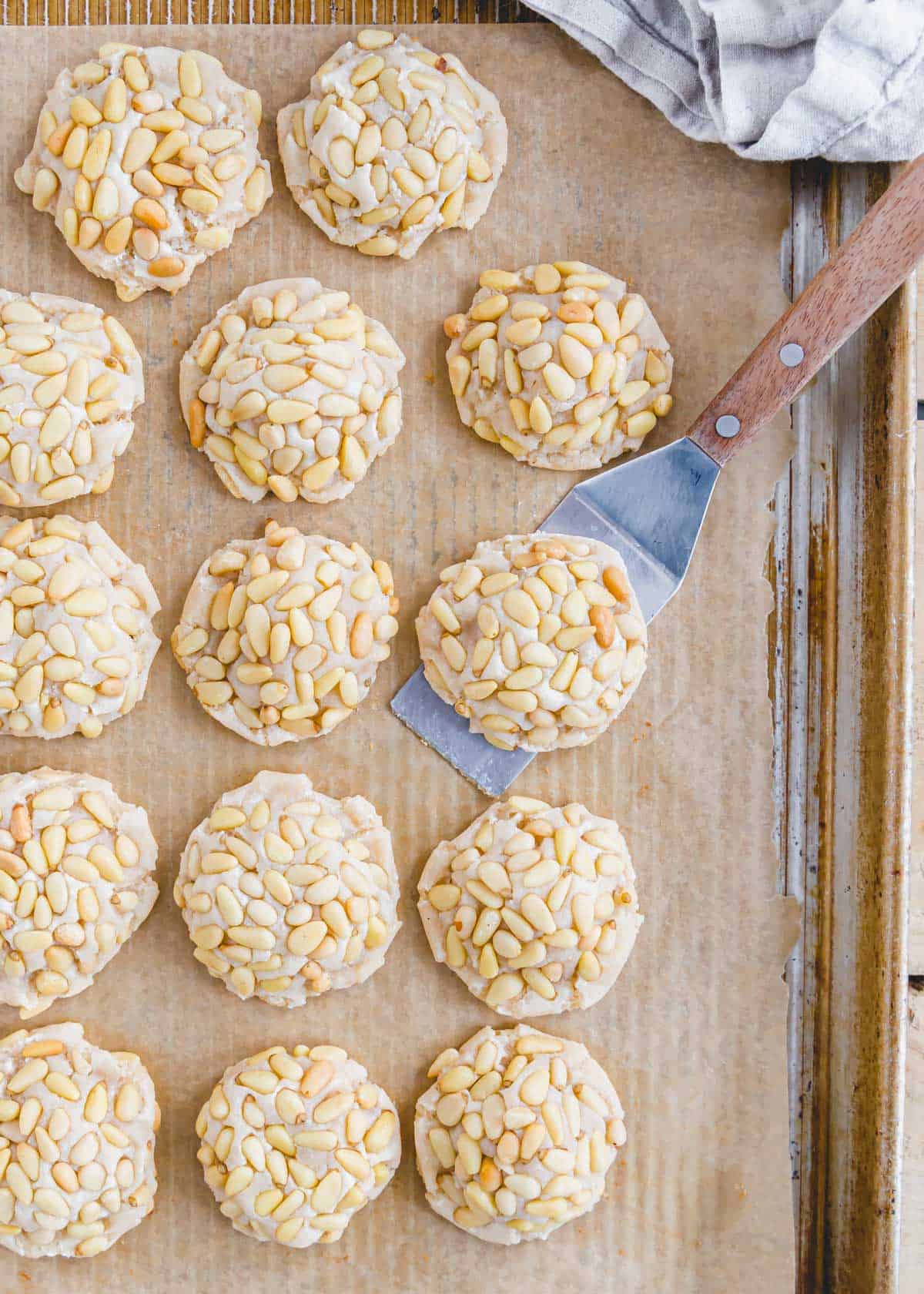
HOW TO STORE PINE NUT COOKIES
This recipe freezes excellently so if you don’t plan to enjoy the cookies within the first day or two, place cooled cookies in a freezer safe bag or container and they’ll keep frozen for a few months.
Defrost at room temperature and dust with powdered sugar to serve.
ARE PIGNOLI COOKIES GLUTEN-FREE?
Yes! The classic Italian recipe for these cookies is gluten-free by default.
Try this recipe for great gluten-free sugar cookies.
WHAT ARE PIGNOLI COOKIES MADE OF?
The original recipe uses almond paste, sugar, egg whites and pine nuts. It’s quite simple and a great naturally gluten-free treat.
Because we’re making a vegan pine nut cookie recipe, we also make a few other tweaks besides the aquafaba swap.
Without egg whites to bind, I found it necessary to add a bit of almond flour, some tapioca starch and baking powder just to help everything come together in the cookie.
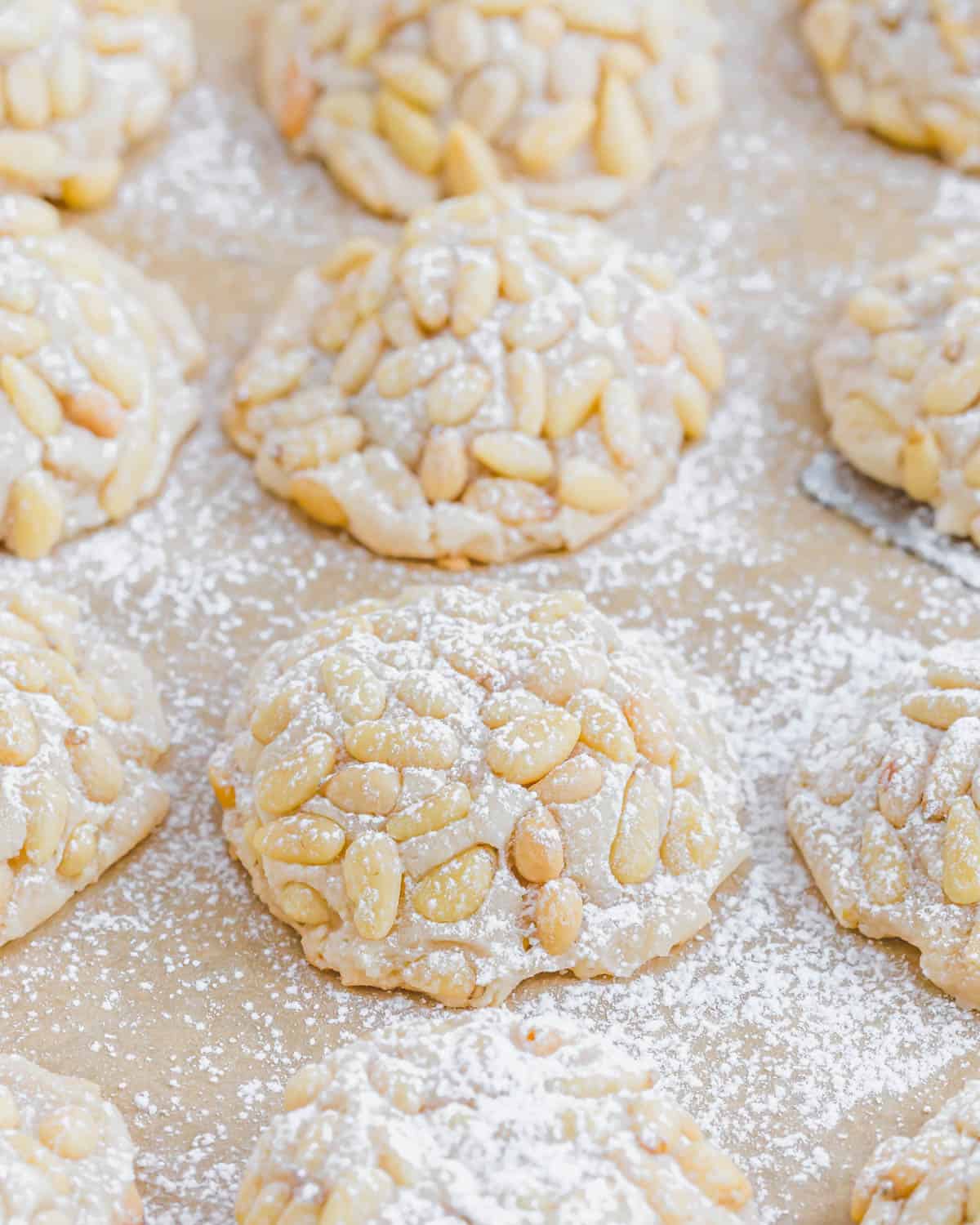
RECIPE TIPS AND TRICKS
- Pine nuts are not cheap! If you have a bulk-store membership, look for them there. I buy mine at BJ’s where they’re significantly less expensive than the regular grocery store and you get a larger amount. Alternatively, you can adorn the cookies with sliced almonds instead of pignoli nuts. Almonds work very well since these are an almond paste based cookie anyway! Italian almond cookies are also an option as they’re basically a pignoli cookie recipe without any nuts adorning the outside of the cookie.
- Use more pine nuts than you think necessary. Because the cookies spread a bit when baking, if you only put them on the top of the cookie dough ball, they’ll look quite sparse once baked. A traditional pignoli cookie has pine nuts covering the entire surface except the very bottom.
- Get an oven thermometer! While this is something everyone should have since ovens are notorious for not being accurate to their stated temperature, it’s incredibly important when baking delicate recipes like this. They’re very inexpensive. I have this $6 one from Amazon.

WHY ARE MY PIGNOLI COOKIES FLAT?
Here are a few tips to avoid the pignoli cookies becoming flat:
- Make sure to not press the cookies down when placing on the baking sheet. They should be a ball of dough completely circular in nature and weighing about 25g each (before rolling in the pine nuts).
- Carefully monitor the cookies while baking. They need to be pulled from the oven when the nuts are just starting to turn brown but before the cookies have totally spread. They will flatten out and spread a little during the baking process but the middles should still be quite puffy and thick like seen in these pictures.
- Maintaining the proper oven temperature while baking is imperative in this recipe. Make sure to have a good oven thermometer to verify a constant 350°F.
- Don’t add extra sugar or change the measurements of the ingredients in the recipe. More sugar will cause the cookies to spread. Don’t worry, pignoli cookies are quite sweet, you shouldn’t need any extra sugar!
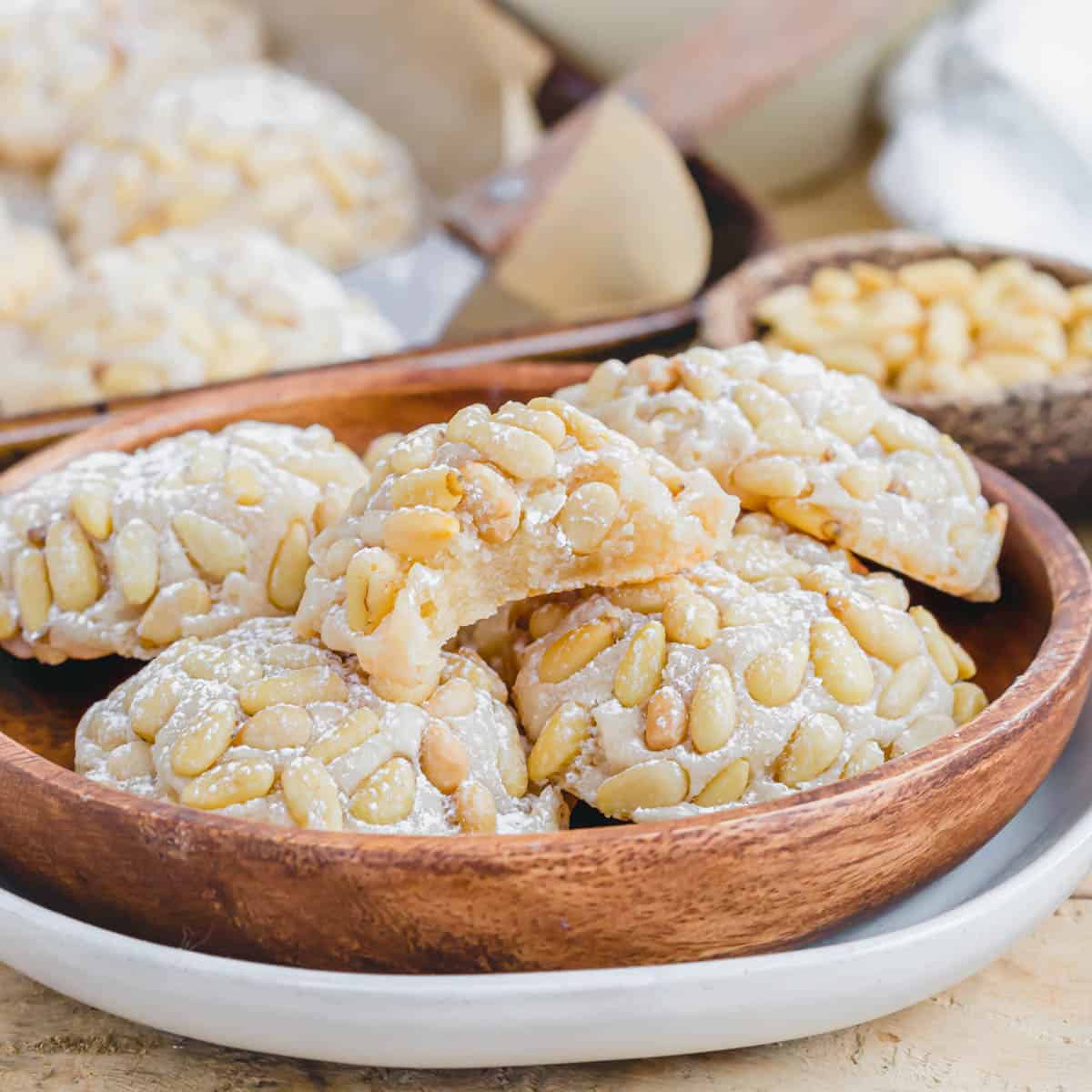
MORE VEGAN COOKIE RECIPES TO TRY:
Pumpkin Biscotti
Vegan Thumbprint Cookies
Oatmeal Chocolate Chip Cookies
Healthy Carrot Cake Cookies
Vegan Oatmeal Raisin Cookies
Vegan Pignoli Cookies
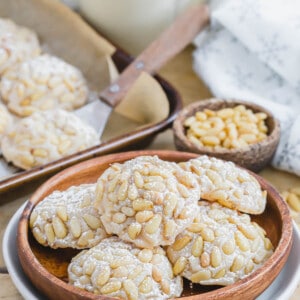
Equipment
Ingredients
- 16 ounces almond paste
- 1/2 cup blanched almond flour
- 1 cup sugar
- 1 tablespoon tapioca starch
- 1/2 teaspoon baking powder
- 1/2 teaspoon salt
- 1 teaspoon lemon zest
- 1/3 cup aquafaba, *see note
- 1/2 – 3/4 cup pignoli nuts, pine nuts for rolling
- powdered sugar for dusting
Instructions
- Preheat oven to 350°F and line two large baking sheets with parchment paper.
- Place pine nuts in a small bowl. Set aside.
- Break up almond paste into chunks and add to food processor. Pulse until coarsely chopped.
- Add almond flour, sugar, tapioca starch, baking powder, salt and lemon zest and process until combined with almond paste and the mixture is the texture of fine sand.
- Add 1/4 cup of the aquafaba and continue to process, scraping down sides as needed until the dough comes together. It should be smooth and paste-like. Add the remaining aquafaba if needed to achieve this texture.
- Using a small cookie scoop or tablespoon (about 25g of dough), roll dough into a smooth ball between your hands. Press the dough ball into the pine nuts so that most of the dough (leave just the bottom bare) is covered with nuts. Place on the prepared baking sheet. Repeat with remaining dough spacing the cookies out by 2 inches.
- Bake for about 15 minutes until the pine nuts are just starting to turn golden brown. Rotate baking sheets halfway through baking if they don't fit on the same rack. Cookies will have slightly spread/flattened but should remain relatively round/puffy. They will be very soft when first removed from the oven.
- Remove the baking sheets from the oven and let the cookies cool completely on the baking sheet.
- Dust with powdered sugar before serving if desired.
Notes
Nutrition
Nutrition information is automatically calculated, so should only be used as an approximation.
Gina Matsoukas is an AP syndicated writer. She is the founder, photographer and recipe developer of Running to the Kitchen — a food website focused on providing healthy, wholesome recipes using fresh and seasonal ingredients. Her work has been featured in numerous media outlets both digital and print, including MSN, Huffington post, Buzzfeed, Women’s Health and Food Network.




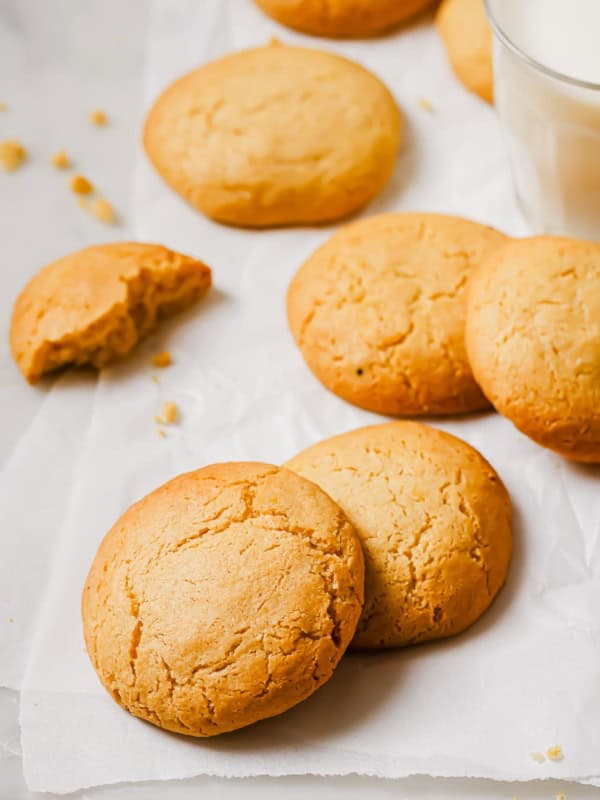
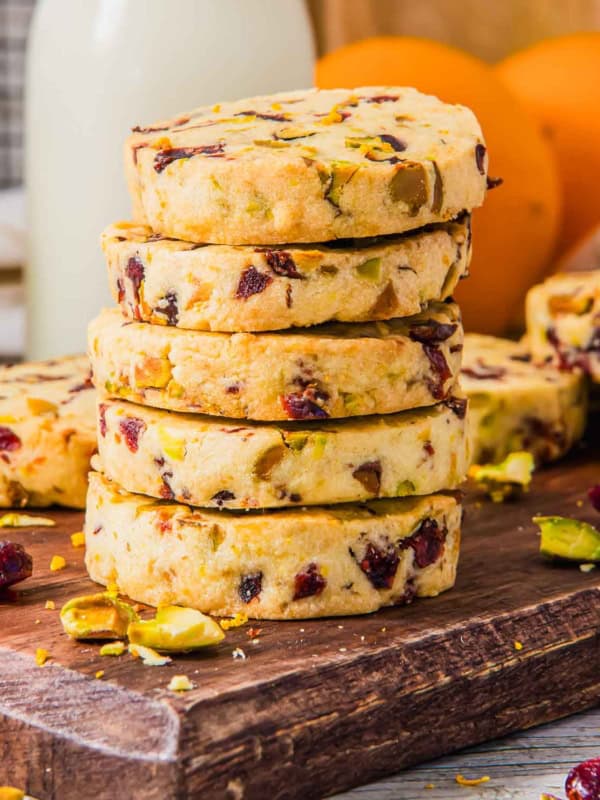









What is Aquafaba??? I never heard of it. where would I get it?? can it be replaced/ with a more common ingredient?
If you read the post, it details what aquafaba is. It’s a vegan alternative for egg whites and it’s the liquid in the can from chickpeas. If you want a non-vegan version, there are plenty of regular pignoli cookie recipes online that use egg whites.
Can I substitute solo almond filling for the paste? Also, can I substitute egg whites from a container for the aquafaba.? I don’t do vegan foods.
Hi Marcia – Honestly, it sounds like you’d be better off just searching for a regular pignoli cookie recipe than trying to make this one. It was developed specifically for making the traditional recipe vegan so if you’re wanting to use non-vegan ingredients, just find a regular recipe. I haven’t tested this with the ingredients you’re asking about so I can’t tell you if the recipe would work and I’d hate to see you waste your efforts. Regardless, however, I don’t suggest using egg whites from a container in place of egg whites from an egg when baking. They don’t give the same lightness or airy texture to a baked good.
Hi! As the recipe calls for 1/4 cup of aquafaba, if I were to use Just Egg or Egg Replacer, would the equivalent be 2 “eggs?”
I made these cookies for our vegan friends this Christmas and they adored them! Thanks so much for sharing the recipe!
This was a new to me recipe and it did not disappoint! I’ve always wanted to try pignoli cookies because I enjoy pine nuts in savory dishes. Going to be making these again. Thanks for the recipe!
These are such fun Italian cookies! Will be great with a cup of tea.
I knew these will be a hit in my family. Almond cookies with pine nuts are a real delectable situation and no one could believe me these are vegan, that’s how tasty they were :)
I adore these cookies! The almond flavor is so delicious and the pine nuts were an unexpected, tasty twist.
These were delish! I love pine nuts, and these cookies are such a fun way to eat them!
These are a new to me cookie but they were easy to make and delicious. I will definitely make them again.